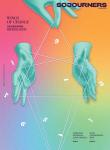WE HAVE SEVERAL readings this month where God creates something out of nothing — or at least out of pretty limited materials. In the opening chapters of Genesis, we see creation birthed from God’s imagination and curiosity. In the story of Sarah and Abraham, a child is conceived in a womb so postmenopausal that the now-pregnant woman can’t help but laugh (Genesis 18). A well appears from nowhere to quench the thirst of a dying woman and her child (Genesis 21:19). God “calls into existence the things that do not exist” (Romans 4:17). And God turns death to life through the mysteries of resurrection (Romans 6:1-11).
This month’s lectionary readings make God’s continuous creation — as well as God’s continual renewal of creation — explicit. But the fact is, once we’re looking for it, all of scripture tells these stories of renewal. God is always creating, re-creating, and reimagining our world. God is always making a way where there was no way before. God continually turns death to life. And, just as importantly, we are called to participate in God’s divine practices of continuous creation, in God’s own divine practice of everyday resurrection.
As we exit a series of some of the higher holy seasons in the liturgical year — Epiphany, Lent, Easter, and Pentecost — June quiets down from such intensity. The slower pace to which (in some places) the warm summer sun calls us can inspire us to seek out everyday resurrection wherever God hides it. How is the Spirit calling you to partner with divine practices of renewal, with everyday resurrections?
June 4
Wearing the Crown
Genesis 1:1 - 2:4; Psalm 8; 2 Corinthians 13:11-13; Matthew 28:16-20
THERE'S A SCENE in Netflix’s series The Crown that I love. Britain’s Princess Elizabeth, seated in Westminster Abbey’s high altar, is anointed Queen Elizabeth II by the Archbishop of Canterbury. He falters for a moment, nervous to touch this woman’s body, yet assured by his sacred script: I anoint you “as kings, priests, and prophets” were anointed before, so be “blessed and consecrated Queen over the peoples whom the Lord thy God hath given thee to rule and govern. In the name of the Father, and of the Son, and of the Holy Ghost.” The scene is shocking because it reminds us that the queen’s vocation — at least according to this rite — is not political. It’s divine.
For centuries, this is the kind of backdrop Christians had in mind when they encountered psalms extolling royal monarchies — such as Psalm 8. God’s name is “majestic.” God’s glory is “set above the heavens.” And again, “O Lord, our Sovereign, how majestic is your name in all the earth” (verse 9). We humans — those made in God’s image — the psalmist adds, are also “crowned ... with glory and honor” (verses 4-5). In other words, we too are anointed as royalty in God’s sight.
The Crown cuts straight from Elizabeth’s coronation to a scene with her Uncle Edward, the abdicated king, watching the ceremony with friends in his Paris villa. Elizabeth’s anointing is the only portion of the ceremony not televised. “Now we come to the anointing: the single most holy, most solemn, most sacred moment of the entire service,” Edward explains. “So how come we don’t get to see it?” asks his mocking friend. “Because we are mortals,” Edward responds.
But the psalmist makes me wonder. The psalmist seems to call us to the dignity — and responsibility — of the crown: to a vocation that isn’t just political, but divine.
June 11
Befriending a Hungry God
Hosea 5:15 - 6:6; Psalm 50:7-15; Romans 4:13-25; Matthew 9:9-13
PREACHERS RARELY CHOOSE the psalm for their primary sermon text. So, it might seem strange to focus for two Sundays on these seldom-preached scriptures. But because I’ve encouraged us to transgress orthodoxy’s borders to create new invitations to God’s own self-revelation, I couldn’t resist this one line where God, speaking through the psalmist, says, “If I were hungry, I would not tell you, for the world and all that is in it is mine” (Psalm 50:12). An orthodox interpretation would understand God to be saying: I don’t get hungry because I’m a fully self-sufficient God. But a riskier interpretation could understand God as saying: If I were hungry, I’d keep it secret. And if God could get this secret hunger pang, then that would mean that God could suffer.
It wasn’t until the 20th century that theologians really began to loosen our grip on God’s impassibility (the orthodox idea that God can’t suffer). It took the so-called “bloodiest century” to get theologians to wonder about God suffering with us in our suffering — something that is now a widely accepted Christian belief. What if we pushed that possibility just a little further — if only for a moment — to imagine God’s suffering coming forth in the form of a stomach’s growl? Would that change how we thought about mass starvation due to ecological destruction, or food insecurity due to hypercapitalist economics? If the world and all that is in it belongs to God, then that means everything should be shared by everyone. What if when Jesus tells us that we feed him by feeding the hungry (Matthew 25:35), he’s really trying to tell us that human hunger can travel deep into the pit of the transcendent God’s belly?
June 18
Sarah’s Laugh
Genesis 18:1-15, 21:1-7; Psalm 116:1-2, 12-19; Romans 5:1-8; Matthew 9:35 - 10:23
MY SPOUSE AND I struggled with infertility for seven years. During that time, whenever I heard Sarah’s story in Genesis 18, I’d fume. The only thing that made me angrier than the story itself was a well-intentioned Christian telling me, “If it could happen for Sarah, it can happen for you.” But what angered me most (because I felt a lot of anger in those years) was that Sarah laughed when she learned she was pregnant. How could this woman laugh at receiving the blessing I was spending 99 percent of my energy trying to find?
Then I peed on a stick. Got two lines instead of one. And what did I do? I laughed.
About 10 percent of people of reproductive age in the United States experience fertility issues. Countless queer and same-sex couples or people wanting to single parent can’t access the health care required to create the families they are called to have. The stigma experienced by those who are “childless by choice” is real as well. But this week’s Genesis reading focuses on the devastating situation of longing to become a parent and being unable to.
Sarah’s laugh and mine: They weren’t the joy of humor. They were the sounds a body makes when it lets go of all the pain it didn’t realize it was holding. People in the pews across the world are going to hear Sarah’s story. How it lands with each of us will have everything to do with how and whether our bodies have been able to let go of pain.
Sarah’s story requires tenderness in preaching — as well as throughout the worship, rituals, and pastoral care that accompany the sermon. Because not everybody gets to laugh.
June 25
Our Small Resurrections
Genesis 21:8-21; Psalm 86:1-10, 16-17; Romans 6:1-11; Matthew 10:24-39
THE IDEA IN Paul’s letter to the Romans that “if we died with Christ, we believe that we will also live with Christ” (6:8) is one of those theological truisms that can lose meaning through ubiquitous use. But as we reflect on how God’s continual creation can make something where there was nothing before, it’s worth asking what we really mean when we invoke this death-to-life dynamic.
In Matthew’s gospel this week, Jesus tells his followers that “those who lose their life for my sake will find it” (verse 39). It’s important to remember that many early Jesus followers were martyred in his name. (Just as many continue to be today.) So, as Paul tries to interpret Jesus’ words in this letter to the community in Rome, he’s not just deploying death and life as metaphors. Rather, both were pressing physical and metaphysical concerns. His words have import for this world and the world we can’t yet know.
All this means that the call to journey from death into life in Christ isn’t just about emulating Jesus’ ways of being in the world. It’s more than hitching a ride with him along death’s winding way. Rather, to die and live with him requires that we’re connected to him — that we’re actually in him as he too is in us (see John 17) — so that we can pass through the mortal and immortal veil as one. This is a union that is mystical, beyond our knowing, and yet somehow intuitively grasped in our daily walk with the Holy Spirit and in our attempts to participate in God’s divine practices of everyday resurrection.

Got something to say about what you're reading? We value your feedback!







